
Various marine protected areas exist to conserve unique coral reefs and rich marine biodiversity.
Support operators adhering to these efforts. Respect marine protected area rules.
Rules include not touching coral or removing marine life. Use Reef-safe sunscreen.
Responsible actions contribute to preserving the island environment.
Waste management poses a challenge due to limited land and resources. Landfills are small, and recycling infrastructure is very limited.
Bring reusable items. Especially when visiting outer islands or remote beaches, carry out all your trash. Do not leave anything behind.
Support accommodations and tour operators who show dedication to environmental protection. Look for businesses that dispose of waste responsibly.
These businesses also promote reef-safe practices and encourage the use of appropriate sun protection.
Consider purchasing carbon offsets for your flights. Air travel contributes to carbon output. Services like Terrapass offer options.
Offsets lessen the environmental footprint of your journey. Many airlines and travel agencies offer such programs.
Freshwater is a precious resource on these low-lying atolls. The islands rely heavily on rainfall collected in cisterns. Be mindful of your water usage.
Cultural sensitivity leads to positive interactions with the local people.
Support local initiatives that work to preserve and promote traditional Marshallese culture, language, and art forms.
Be polite, patient, and respectful of local customs. "Island time" means things move at a slower pace. Learning a few Marshallese phrases shows respect.
Be mindful of privacy. Do not photograph children without explicit parental permission. If someone indicates they do not wish to be photographed, respect their wishes immediately.
Dress modestly when visiting churches or religious sites. This means covering shoulders and knees for both men and women. Remove hats upon entering. Be quiet and respectful during services.
Avoid public displays of affection. Do not point with your finger; use an open hand or nod.
Show high regard for elders. This is a deeply ingrained cultural value.
The history of nuclear testing is sensitive. Approach it with respect and understanding.
Responsible travel means your visit benefits the local economy and communities.
Seek out and support community-based tourism, especially on outer islands. This ensures direct benefit to locals.
These initiatives offer the most authentic cultural immersion experiences.
They place income and employment opportunities where they are most needed in local communities.
Be aware of issues like child labor. Ensure your interactions and purchases stay ethical.
If something feels exploitative or inappropriate, avoid it completely.
For charitable giving, contribute through established local organizations, schools, or community projects.